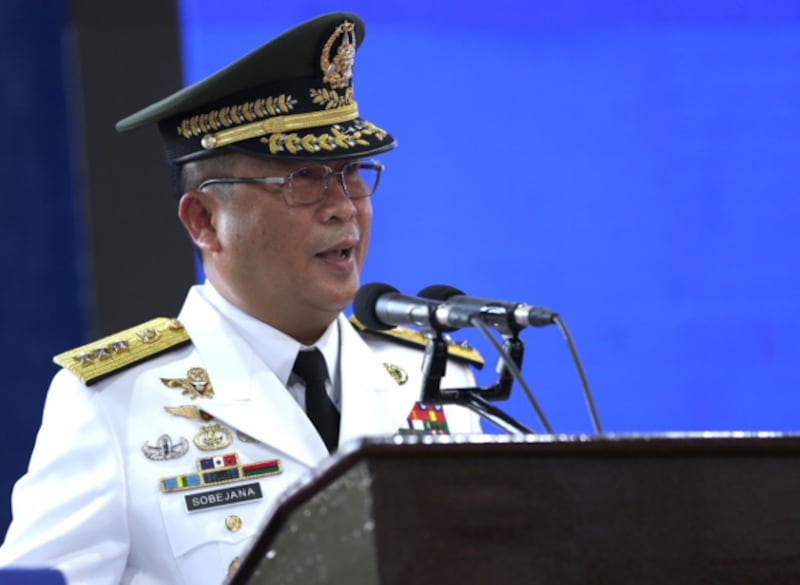The new Philippine military commander said Tuesday he was ordering more assets deployed to the South China Sea to safeguard fishermen after Beijing passed a law empowering its coast guard to use force against foreign boats in the contested waterway.
Gen. Cirilito Sobejana made the comments a day after Foreign Secretary Teodoro Locsin Jr. rejected suggestions that the Philippines lodge a protest against the Chinese law before the United Nations.
“[T]he pronouncement of China that their coast guard can open fire on people intruding into their territory is very alarming,” Sobejana, who took over last week as commander of the Armed Forces of the Philippines (AFP), said during a virtual news conference.
“Our compatriots do not go to that disputed area to make war, but for livelihood. So what we will do as part of our mandate to secure the people is to increase our visibility through the deployment of more naval assets,” he said in a mix of Tagalog and English, referring to Filipino fishermen.

On Jan. 22, China’s National People’s Congress passed the Coast Guard Law, which placed its coast guard under direct military command. The law, which took effect on Feb. 1, contains a provision that allows China Coast Guard ships to use weapons against any vessels found in waters that Beijing claims as its territory.
On Jan. 27, Locsin, Manila’s foreign secretary announced that the Philippine government had filed a protest against the new Chinese law. At the time, he said the legislation was “a verbal threat of war to any country that defies the law; which, if unchallenged, is submission to it.”
Last week, Locsin publicly clashed with the spokesman for President Rodrigo Duterte, Harry Roque, who said that the government could raise China’s new law before a U.N. tribunal. At the time, the Philippines’ top diplomat told Roque to “lay off” foreign affairs.
Beijing, through its embassy in Manila, meanwhile claimed on Feb. 1 that its Coast Guard Law had been “misinterpreted” and was nothing but a normal domestic legislative activity.
While China claims nearly all of the South China Sea, six other Asian governments – Brunei, Indonesia, Malaysia, Vietnam the Philippines and rival Taiwan – claim parts of the potentially mineral-rich waterway. Indonesia is not officially a party to the dispute, but is at odds over Beijing’s claims to parts of the sea that overlap on its territorial waters.
On Monday, Locsin turned down suggestions regarding the U.N., and said there was no need to reopen litigation that the Philippines had won in 2016, shortly after President Rodrigo Duterte took power.
“I am not gonna go back there because the Coast Guard Law has some claims as to the extent of their territory,” Locsin said then. “That will re-open the arbitral award and I’m not going to give them a chance to do that.”
The 2016 ruling by the Permanent Court of Arbitration at The Hague rejected Beijing’s expansive claims to the South China Sea and found in favor of Manila. Beijing has never recognized the ruling.
Instead of seeking to enforce the ruling, Duterte sought to ingratiate himself to China by distancing himself from traditional ally the United States in exchange for Chinese investments and businesses.
Only last year did Duterte unequivocally voice his position on the South China Sea. Speaking before the U.N. General Assembly in September, he said the ruling was “beyond compromise” and already “part of international law.”
Froilan Gallardo in Cagayan de Oro, Philippines, contributed to this report.
